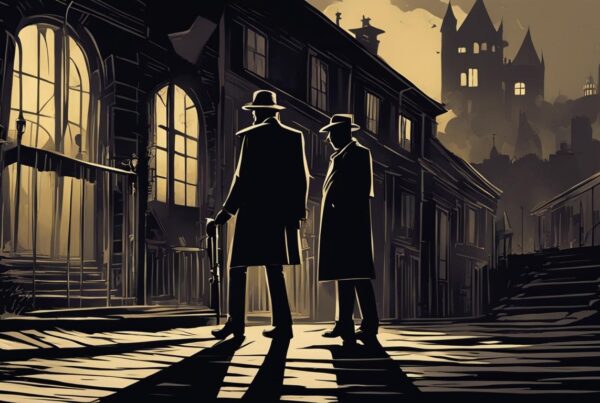If you’re looking for a thought-provoking read that explores the complexities of modern thought and culture, then “The Death of Adam” by Marilynne Robinson is definitely worth a look. This book of essays delves into a broad range of topics, offering insightful commentary on everything from literature and religion to science and politics.
In this article, we’ll provide a brief overview of the book and explore some of its key themes, as well as taking a closer look at the author, Marilynne Robinson.
About the Author
Marilynne Robinson is an acclaimed American novelist, essayist, and thinker. Born in 1943 in Sandpoint, Idaho, Robinson studied at Pembroke College and earned a Ph.D. in English from the University of Washington. She has since held teaching positions at various universities, including the University of Iowa and the University of Kent.
Robinson’s literary works have garnered numerous awards and critical acclaim, including the Pulitzer Prize for Fiction for her novel “Gilead.” Her other notable works include “Housekeeping,” “Lila,” and “Home.”
Overview of “The Death of Adam”
“The Death of Adam” by Marilynne Robinson is a collection of essays that explore modern thought, culture, and society. Robinson draws on history, philosophy, and theology to shed light on topics such as American politics, the role of religion in modern life, and the nature of consciousness. Throughout the book, Robinson challenges conventional wisdom and offers insightful commentary on the complexities of the modern world.
One of the key themes of “The Death of Adam” is the decline of American culture and its disconnection from its moral and intellectual roots. Robinson argues that this decline is closely connected to the fragmentation of knowledge and the separation of science, religion, and the humanities. She suggests that a more holistic approach to education and intellectual inquiry is necessary to generate a deeper understanding of the world and our place in it.
Another significant theme in the book is the importance of faith and its role in shaping morality and ethics. Robinson takes issue with the secularization of modern society and argues that faith provides a vital framework for human values and behavior. She also suggests that faith and reason are not incompatible, but rather, can complement each other in our pursuit of truth and understanding.
Overall, “The Death of Adam” is a complex and thought-provoking collection of essays that challenges readers to reevaluate their assumptions about modern life and society. Robinson’s unique perspective and insightful commentary make this book a must-read for anyone interested in the intersection of philosophy, religion, and culture.
Robinson’s Perspective on Modern Thought
Marilynne Robinson’s perspective on modern thought is complex and multifaceted. In her essays, she explores the ways in which modern thinking has both shaped and been shaped by broader cultural and societal forces.
At the heart of Robinson’s perspective is a deep concern for the ways in which modern thought has led us away from a sense of shared humanity and toward individualism and isolation. She argues that this trend has resulted in a fractured society in which people are increasingly alienated from one another, leading to a breakdown in trust and a pervasive sense of anxiety.
Robinson also critiques the ways in which modern thought has led us to focus almost exclusively on the material world, neglecting the spiritual and existential dimensions of human life. She argues that this approach has led to a sense of meaninglessness and despair that is deeply at odds with human nature.
Despite these critiques, Robinson is not pessimistic about modern thought. She believes that it is possible for us to reconnect with our shared humanity and to rediscover the spiritual and existential dimensions of life. To do so, however, we must be willing to question our assumptions and to engage in open and honest dialogue.
“The assumption that we are as we must be, and that there is no alternative to the way things are, is despair. It is the ultimate impoverishment of imagination.” – Marilynne Robinson
Robinson’s perspective on modern thought is both thought-provoking and challenging, forcing readers to confront some of the most pressing issues of our time. Through her essays, she offers a unique and compelling vision of what it means to be human in a rapidly changing world.
Critique of Contemporary Culture
In “The Death of Adam,” Marilynne Robinson presents a thought-provoking critique of contemporary culture, arguing that it is increasingly marked by a lack of depth, substance, and moral clarity. According to Robinson, modern society is plagued by a pervasive sense of emptiness and shallowness, which manifests itself in various ways, from the prevalence of consumerism and materialism to the erosion of traditional values and ideals.
Robinson is particularly critical of the way in which contemporary culture values entertainment and spectacle over intellectual rigor and authenticity. She argues that this emphasis on superficiality and sensationalism has led to a culture of distraction and escapism, which ultimately undermines our capacity for critical thought and ethical reflection.
Moreover, Robinson contends that contemporary culture is marked by a troubling lack of historical awareness and perspective, which contributes to the erasure of important cultural traditions and achievements. In her view, this cultural amnesia not only impoverishes our understanding of the past, but also impedes our ability to imagine and create new possibilities for the future.
“Contemporary culture is best understood as a kind of collective amnesia that erases much of the past and ignores the complexity of the present. It is a culture of superficiality, in which spectacle and entertainment are prized above all else.”
The Role of Literature and the Humanities
For Robinson, the key to countering the negative trends in contemporary culture lies in the cultivation of a more robust and critical intellectual culture, marked by a renewed appreciation for literature and the humanities. She argues that literature in particular has the capacity to inspire empathy, expand our sense of the world, and challenge our assumptions and beliefs.
Robinson believes that literature can provide a much-needed antidote to the shallow and fragmented nature of contemporary culture by offering readers a deeper and more nuanced understanding of human experience and values. Through literature, she argues, we can gain insight into the complexities of history and culture, and grapple with the ethical and philosophical questions that shape our lives.
A Call to Action
Overall, Marilynne Robinson’s critique of contemporary culture is a powerful call to action, inviting readers to reconsider their assumptions and to engage more deeply with the world around them. By highlighting the dangers of superficiality and distraction, she challenges us to cultivate a more thoughtful and reflective culture, one that values depth, complexity, and human connection.
Robinson’s message is a timely reminder of the importance of critical engagement and intellectual curiosity, and her insights are likely to resonate with anyone who is concerned about the state of modern society and culture.
Analysis of Key Essays
“The Death of Adam” is a collection of essays by Marilynne Robinson that explores a wide range of topics and themes related to modern thought and culture. In this section, we will take a closer look at some of the key essays in “The Death of Adam” and their significance.
“The Tyranny of Petty Coercion”
This essay examines how modern society is plagued by a sense of pettiness and coercion. Marilynne Robinson argues that while people have more freedom than ever before, their lives are constrained by an endless stream of small demands and obligations that leave them feeling trapped and unfulfilled. She suggests that the solution to this problem lies in a renewed emphasis on compassion and empathy, which can help to break down our narrow, self-centered perspectives.
“Open thy Hand Wide”
In this essay, Marilynne Robinson explores the biblical concept of grace and its significance for modern society. She argues that grace offers a transformative vision of human life that emphasizes forgiveness, generosity, and love. Through a close reading of various biblical passages, she shows how grace can offer a powerful antidote to the cynicism and despair that often characterize modern life.

“The World and the Parish”
In this essay, Marilynne Robinson discusses the tension between the local and the global in modern life. She argues that while globalization has brought many benefits, it has also led to the erosion of local communities and cultures. She suggests that the key to navigating this tension lies in cultivating an appreciation for both the particular and the universal, and recognizing the interconnectedness of all things.
“Imagination and Community”
This essay explores the relationship between imagination and community, and argues that both are necessary for a healthy society. Marilynne Robinson shows how imagination can help to break down the barriers between individuals and create a sense of shared purpose and connection. She also shows how communities can foster the kind of imaginative thinking that is necessary for genuine social change.
Through these key essays and others, “The Death of Adam” offers a rich and thought-provoking exploration of modern thought and culture. Marilynne Robinson’s writing is both insightful and inspiring, offering readers a powerful vision of the possibilities for human life in the midst of a confusing and often chaotic world.
Robinson’s Writing Style
Marilynne Robinson’s writing style is renowned for its lyricism and depth, drawing the reader into her essays and making them feel as though they are having a conversation with the author herself. Robinson’s prose is marked by a careful attention to detail and a deep engagement with her subject matter, as well as a tendency towards introspection and philosophical reflection.
One of the most striking aspects of Robinson’s writing style is her ability to seamlessly integrate personal anecdotes and observations into her broader discussions of modern thought and culture. By grounding her musings in lived experience, Robinson makes her ideas feel all the more compelling and urgent, inviting readers to think deeply about the world around them and their place in it.
Robinson’s writing style is often regarded as cerebral and intellectual, but it is also deeply emotional and empathetic. Her essays are imbued with a sense of human warmth and compassion, as well as a keen awareness of the struggles and challenges that face us all in our daily lives. By tapping into this wellspring of emotion and connecting it to larger philosophical and cultural themes, Robinson creates a reading experience that is both intellectually stimulating and emotionally resonant.
Ultimately, Marilynne Robinson’s writing style is an embodiment of her unique perspective on the world. By blending her personal experiences with broader cultural and philosophical considerations, Robinson offers readers a distinctive perspective on modern thought and culture—one that is infused with empathy, insight, and wisdom.
Themes Explored in “The Death of Adam”
Marilynne Robinson’s “The Death of Adam” is a thought-provoking collection of essays that explores various themes related to modern thought, culture, and society. One of the prominent themes that Robinson delves into is the concept of individualism and its effects on human relationships and society as a whole.
Robinson also analyzes the role of religion and faith in shaping cultural attitudes and values, and how it is often undervalued in contemporary society. She examines topics like history, politics, and the arts, often comparing and contrasting modern perspectives with those of the past.
The writer also explores the idea of morality and ethics and the challenges posed by a growing secular culture that seems to lack a cohesive moral framework. Robinson’s insights into these themes are both compelling and thought-provoking, making “The Death of Adam” an engaging and illuminating read for anyone interested in the complexities of modern life and culture.
“It seems to me that contemporary culture is in urgent need of a sense of the past and of professionals capable of creating it.”
– Marilynne Robinson, The Death of Adam
Influences on Robinson’s Thinking
Marilynne Robinson has been influenced by a range of thinkers and writers, both contemporary and historical. These influences are evident in her essays and provide insight into the philosophical and theological foundations of her work.
One of the most prominent influences on Robinson’s thinking is John Calvin, the 16th-century French theologian and founder of Calvinism. Robinson has drawn on Calvin’s ideas about grace, predestination, and the role of the individual in society. Calvin’s emphasis on the importance of education and the pursuit of knowledge is also evident in Robinson’s work, particularly in her emphasis on the value of intellectual inquiry.
Another significant influence on Robinson is the American Puritan tradition. She has been inspired by the works of Puritan writers such as John Winthrop and Jonathan Edwards, whose ideas about the nature of God and the role of religion in society have informed her own views on faith and morality.
Robinson has also cited the works of contemporary writers such as William James, Martin Heidegger, and Dorothy Day as influential in her thinking. James’s pragmatism, Heidegger’s existential philosophy, and Day’s activism have all had an impact on Robinson’s views on morality, politics, and the role of the individual in society.
Robinson’s diverse influences have shaped her thinking and contributed to the depth and complexity of her work. Her essays reflect not only her own intellectual curiosity and expertise but also the rich intellectual tradition from which she draws inspiration.
Reception and Impact of the Book
Upon its publication, “The Death of Adam” by Marilynne Robinson received widespread critical acclaim. It was hailed as a profound and insightful collection of essays that offered a unique perspective on modern thought and culture.
Robinson’s eloquent prose and thoughtful reflections won over many readers, earning her a legion of devoted fans. Her ability to weave together seemingly disparate ideas into a cohesive whole was widely praised, as was her deep empathy for the human condition.
Over the years, “The Death of Adam” has continued to resonate with readers, both within and outside of academic circles. Its impact on the literary world and its relevance to contemporary debates about culture and society cannot be overstated.
“The Death of Adam is a profound work of philosophical and cultural reflection that challenges readers to think deeply about the world we live in. Robinson’s rigorous exploration of complex ideas is sure to leave a lasting impression on anyone who reads it.”
The Influence of “The Death of Adam”
“The Death of Adam” has had a significant impact on both readers and scholars. Its thoughtful analysis of modern thought and culture has inspired many to take a more critical and reflective approach to the issues of our time.
Robinson’s unique perspective has also influenced other writers and philosophers, sparking new debates and analyses about the cultural and political implications of modern thought.
The Legacy of “The Death of Adam”
As we look back on the legacy of “The Death of Adam,” we can see how deeply it has influenced the cultural conversation of our time. Robinson’s insights into the nature of humanity and the complex web of social, political, and cultural forces that shape our lives continue to resonate with readers all over the world.
Her ability to bridge different fields and bring together seemingly disparate ideas has made her a beloved figure in both literary and scholarly circles.
Critical Analysis of “The Death of Adam”
As with any book, “The Death of Adam” by Marilynne Robinson has its strengths and weaknesses. Robinson’s thoughtful analysis of modern thought and culture offers valuable insights for readers, but some critics have pointed to a lack of clarity and structure in the essays.
One strength of Robinson’s writing is her ability to delve into complex topics and present them in an accessible way. Her analysis of the role of religion in modern society, for example, provides a nuanced perspective that challenges popular assumptions. Additionally, Robinson’s writing is often deeply reflective and contemplative, allowing readers to engage with the ideas presented in a meaningful way.
However, some critics have noted that the essays in “The Death of Adam” can be difficult to follow, particularly in terms of the overall structure. While each essay stands on its own, some readers have noted a lack of clarity in terms of how the different ideas and themes connect to each other. Additionally, some have criticized the book for being overly academic, which can deter general readership.
Overall, “The Death of Adam” offers a thought-provoking examination of modern thought and culture through the lens of Marilynne Robinson’s unique perspective. However, readers should be aware of the potential challenges posed by the book’s structure and academic tone.

Comparison to Robinson’s Other Works
Marilynne Robinson’s works stand out due to her unique writing style, exploration of complex themes, and profound insights into the human condition. In this section, we compare “The Death of Adam” to some of her other notable works, highlighting similarities and differences in themes and style.
Themes
One of the recurring themes in Robinson’s works is the intersection between faith and doubt. In “Gilead,” she explored this theme through the perspective of a Congregationalist minister nearing the end of his life. Similarly, in “Home,” she focused on the relationship between a father and a daughter and their differing views on religion. In “The Death of Adam,” Robinson examined modern thought and culture through a theological lens.
Style
Robinson’s writing style is characterized by its poetic prose and sparse yet powerful language. In “Housekeeping,” she created a hauntingly beautiful narrative of two sisters and their unconventional upbringing. In “Lila,” the story of a woman who falls in love with a pastor, Robinson used a nonlinear structure to reflect the protagonist’s fragmented memories. In “The Death of Adam,” she employed a persuasive and contemplative writing style to offer insights into modern thought and culture.
Comparison of Themes and Style in Robinson’s Works
| Themes | Style | |
|---|---|---|
| Gilead | Intersection between faith and doubt | Poetic prose |
| Home | Relationships and religious beliefs | Powerful language |
| Housekeeping | Family and identity | Hauntingly beautiful narrative |
| Lila | Faith and salvation | Nonlinear structure |
| The Death of Adam | Modern thought and culture through a theological lens | Persuasive and contemplative |
Overall, Marilynne Robinson’s works share a deep exploration of complex themes and masterful prose while also showcasing her versatility and range as a writer.
Contemporary Relevance of Robinson’s Ideas
Despite “The Death of Adam” by Marilynne Robinson being published over 20 years ago, her ideas continue to resonate in today’s world. Robinson’s commentary on modern thought and culture remains relevant and thought-provoking, inspiring readers to reconsider their perspectives on society and humanity.
Many of Robinson’s themes and arguments in “The Death of Adam” have gained even greater significance today. For instance, her critique of contemporary culture’s emphasis on productivity and consumerism has become even more pertinent in a society increasingly defined by the pursuit of material possessions and economic success.
Moreover, Robinson’s insights on the effects of technology on human interaction and communication have proven prescient, with the rise of social media and digital communication arguably exacerbating the issues she identified. Her emphasis on the importance of community and shared values also offers a compelling counterpoint to the individualistic culture prevalent in many Western societies.
Robinson’s ideas continue to be discussed and debated in academic circles, demonstrating their ongoing relevance and significance. Her perspective on modern thought challenges readers to consider alternative ways of thinking and being in the world, making “The Death of Adam” a timeless and thought-provoking work.
Impact on Readers and Scholarly Debate
Since its publication, “The Death of Adam” by Marilynne Robinson has had a significant impact on both readers and scholarly debates on modern thought and culture. Robinson’s insightful essays have challenged readers to examine their own beliefs and perceptions, while also contributing to larger philosophical and cultural discussions.
Many readers have praised Robinson’s clear and elegant writing style, as well as her ability to seamlessly weave together a wide range of topics and ideas. Some have even described reading “The Death of Adam” as a transformative experience, inspiring new ways of thinking about the world and one’s place in it.
In academic circles, “The Death of Adam” has been similarly well-received. Scholars have praised Robinson’s unique perspective on modern thought and culture, as well as her ability to draw connections between seemingly disparate topics. Her essays have been cited in numerous academic publications and have sparked ongoing debates in fields such as philosophy, theology, and literary studies.
Overall, “The Death of Adam” has established itself as a thought-provoking and influential work, one that continues to inspire readers and stimulate scholarly exploration.
Key Takeaways from “The Death of Adam”
After analyzing “The Death of Adam” by Marilynne Robinson, we can draw several key takeaways from the book:
- The Death of Adam offers a unique perspective on modern thought and culture, providing readers with insightful commentary on contemporary issues.
- Robinson’s essays are well-crafted and thought-provoking, showcasing her exceptional writing style and intellect.
- The book’s themes of faith, morality, and human nature continue to resonate with readers today, making it a timeless and enduring work.
- Overall, The Death of Adam is a must-read for anyone interested in philosophy, theology, or cultural commentary.
Through her essays, Robinson encourages readers to delve deeper into the complexities of human thought and behavior, offering insights that are both compelling and illuminating.
“Every person is an abridgment of history, of all that humanity has achieved and suffered, the precarious footing that carries us to the future. Every generation partakes of this, learns from this, inherits this. This is inheritance; this is breathing the air of the dead.”
Major Themes of “The Death of Adam”
| Theme | Description |
|---|---|
| Faith and Religion | Robinson explores the role of faith and religion in modern society, emphasizing the importance of spirituality and morality. |
| Cultural Critique | The author critiques contemporary culture and its impact on the human condition, highlighting the need for greater awareness and empathy. |
| Philosophy and Ethics | The essays examine key philosophical and ethical questions, such as what it means to be human and how we should live our lives. |
| Identity and Selfhood | Robinson explores the complexities of human identity and selfhood, offering insights on topics such as gender and race. |
In summary, The Death of Adam is a thought-provoking and insightful book that explores complex themes while offering readers valuable insights into contemporary society and the human condition.
Conclusion
In conclusion, “The Death of Adam” by Marilynne Robinson is a thought-provoking collection of essays that explores modern thought and culture from a unique perspective. Robinson’s deep insights and well-articulated arguments make this book a must-read for anyone interested in these topics.
Throughout this book summary, we have examined the key themes and arguments presented in “The Death of Adam.” From Robinson’s critique of contemporary culture to her analysis of key essays, we have explored the book in detail and highlighted its relevance to modern society.
Overall, “The Death of Adam” offers valuable insights into the complexities of modern thought and culture, and is sure to leave a lasting impact on readers. Whether you are an academic, a student, or simply an interested reader, this book is well worth exploring.
Thank you for reading this book summary of “The Death of Adam” by Marilynne Robinson. We hope that you have found this article informative and engaging, and that it has given you a strong understanding of Robinson’s work.



